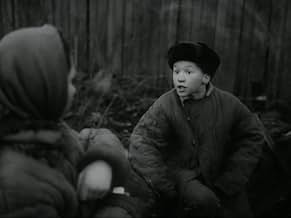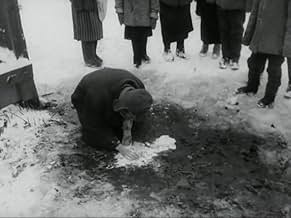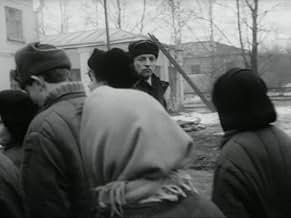IMDb RATING
7.5/10
990
YOUR RATING
Two children living in a remote mining town in the distant wastes of Siberia in 1947, survive poverty and hardship through the warmth of their friendship and a shared sense of humour.Two children living in a remote mining town in the distant wastes of Siberia in 1947, survive poverty and hardship through the warmth of their friendship and a shared sense of humour.Two children living in a remote mining town in the distant wastes of Siberia in 1947, survive poverty and hardship through the warmth of their friendship and a shared sense of humour.
- Awards
- 7 wins & 6 nominations total
- Director
- Writer
- All cast & crew
- Production, box office & more at IMDbPro
Featured reviews
Freeze, Die, Come to Life is the harrowing story of two adolescents, Velarka (Pavel Nazarov) and Galicia (Dinara Drukarova) attempt to cope with poverty and an unstable home life in a Soviet mining town in Siberia near the close of World War II. This was the first film by Russian director, Vitaly Kanevsky, who served eight years in a Soviet labor camp.
Though the title is the name of a Russian children's game, the children here are not playing any games; the stakes are too high. Velarka's mother is a prostitute and the family is poor. Both he and Galicia must sell tea to workers, convicts, and local Japanese POWs in order to survive. Their relationship starts out as antagonistic but they slowly develop a friendship and grudging admiration for each other.
Left to fend for himself, Valerka gets into serious misadventures such as putting yeast in a school sewer causing an overflow onto the city streets, derailing a train, and helping to rob a jewelry store. He must keep running to avoid the police and pursuing jewel thieves. Though the film is bleak, the sensitive relationship of the children and the courage they display is what will stay with you. The ending is grisly but (anticipating Kiarostami's Taste of Cherry by eight years) the cameraman giving directions to the actors reminds us that "it's also a movie".
Freeze, Die, Come to Life was turned down by Russian censors and had to be edited several times before it was approved, giving it a somewhat disjointed feeling. In its final version, however, it won the 1990 Cannes Film Festival's prize for Best First Film. Unfortunately, it received scant distribution in the West and has become an overlooked gem.
Though the title is the name of a Russian children's game, the children here are not playing any games; the stakes are too high. Velarka's mother is a prostitute and the family is poor. Both he and Galicia must sell tea to workers, convicts, and local Japanese POWs in order to survive. Their relationship starts out as antagonistic but they slowly develop a friendship and grudging admiration for each other.
Left to fend for himself, Valerka gets into serious misadventures such as putting yeast in a school sewer causing an overflow onto the city streets, derailing a train, and helping to rob a jewelry store. He must keep running to avoid the police and pursuing jewel thieves. Though the film is bleak, the sensitive relationship of the children and the courage they display is what will stay with you. The ending is grisly but (anticipating Kiarostami's Taste of Cherry by eight years) the cameraman giving directions to the actors reminds us that "it's also a movie".
Freeze, Die, Come to Life was turned down by Russian censors and had to be edited several times before it was approved, giving it a somewhat disjointed feeling. In its final version, however, it won the 1990 Cannes Film Festival's prize for Best First Film. Unfortunately, it received scant distribution in the West and has become an overlooked gem.
10Andy-123
The director received funding for a 10-minute film and used those miniscule funds to make the most spirited film ever made (in my opinion), an extremely moving piece about two children in Siberia. The film is loose-as-a-goose -- there's never been a movie as "un-rigid" as this. In my mind it's a bookend to another film about children, the Spanish film "Spirit of the Beehive." But where that film's depth is in its poetry and mystery, this film's depth is in its emotions and sheer good-fellowship. They're opposites. Except that, to me, there's never been two better films. Why hasn't Kanevsky's second film, "An Independent Life," been released in the U.S.? Why has the second film of Victor Erice (the Spanish director), "The South," been virtually unseen in the U.S.? (It's as good as "Spirit of the Beehive.") I tell you... seeing those films will spoil you for nearly every other film!
Don't come to this expecting much in the way of a plot; it's a bunch of interconnected anecdotes about a boy living in a stark Siberian mining town. Apparently it's semi-autobiographical & filmed on a minuscule budget. Some online reviews claim the boy's mother is a prostitute (I thought her reference to that was metaphorical). The filmmaker certainly doesn't give much context away, but even without understanding much about Stalinist Siberia or knowing exactly what is meant by living in "the zone", for me the film conveys at once the frustration of living in exile with a child's failure to understand. Similarly, in his interaction with his caring older (girl) friend, the young protagonist conveys the often-heartless behavior of younger children. The actors are supposedly non-professionals; they do an excellent job. And the b&w photography is beautifully evocative. My only quibble is the "it's only a movie" ending.
The unusual title (never explained) is supposedly the name of a popular Russian children's game, but the only contest being waged in this remote town on the far eastern edge of Soviet Asia is called survival, and it's clear there aren't too many winners. One of the more exciting Soviet imports in quite a while is also one of the more depressing films ever made, presenting a tough and totally unsentimental depiction of childhood as seen through the eyes of a rebellious schoolboy and the level-headed young girl with whom he develops an antagonistic friendship. There's a strong documentary flavor to the episodic storyline and grainy black and white photography, and writer director Vitaly Kanevsky devotes equal time to the conditions which shape their fate (note the subtle but unmistakable condemnation of Stalinism recurring throughout). In effect the film is more of a mood piece, with the environment itself (ice, mud and manure) becoming the primary character. It's not always an easy film to watch or understand, but the effort can make it a rewarding experience.
Very interesting look into stark Soviet history, in the time of Gulags and "work settlements," as told through the eyes of children who live there.
In between the squalid conditions, flowers of humanity sprout out, in the form of friendship and ill-appreciated loyalties. This is a tale of understanding what life may or must have been like in such settlements. It strikes a chord with those who can or try to understand such environments. The analogies are quite interesting, as they are critical. (Take the scene for instance, of the parade through the sewage around the school, while hoisting Stalin's portrait on high.)
While not as other Russian imports (VOR/THE THIEF, BURNT BY THE SUN or the French-Russian film, THE EAST), ZAMRI, UMRI, VOSKRESNI! has a message and a decent story to tell.
Recommended.
In between the squalid conditions, flowers of humanity sprout out, in the form of friendship and ill-appreciated loyalties. This is a tale of understanding what life may or must have been like in such settlements. It strikes a chord with those who can or try to understand such environments. The analogies are quite interesting, as they are critical. (Take the scene for instance, of the parade through the sewage around the school, while hoisting Stalin's portrait on high.)
While not as other Russian imports (VOR/THE THIEF, BURNT BY THE SUN or the French-Russian film, THE EAST), ZAMRI, UMRI, VOSKRESNI! has a message and a decent story to tell.
Recommended.
Did you know
- ConnectionsEdited into Histoire(s) du cinéma: Une vague nouvelle (1999)
- SoundtracksYosakoi-bushi
(Kôchi prefecture folk song)
Details
- Release date
- Country of origin
- Languages
- Also known as
- Freeze Die Come to Life
- Filming locations
- Partizansk, Russia(mining town formerly known as Suchan)
- Production companies
- See more company credits at IMDbPro
- Runtime
- 1h 45m(105 min)
- Color
- Sound mix
Contribute to this page
Suggest an edit or add missing content













